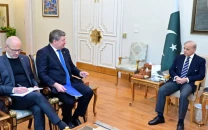Gender inequality — an equal issue for men
Scholars from around Asia discuss concept of feminism in their regions

Scholars from around Asia discuss concept of feminism in their regions PHOTO: FILE
The issue of gender inequality cannot be addressed without the help of men. It affects men as much as it affects women. This was the crux of the speeches made by scholars and activists at a seminar here on Tuesday.
The seminar on ‘Feminism and Social Movements in Asia’ was arranged by the Pakistan Institute of Development Economics (PIDE) in collaboration with Friedrich-Ebert-Stiftung, at Quaid-e-Azam University.
Women’s Excellence Month: The shushing and shaming ends now
The event aimed at generating a debate to rethink the role of women in both the Islamic and Western world, without offending either way of life.
International scholars including Gadis Arivia, philosophy professor at the University of Indonesia, Tania Haque, women and gender studies professor at the University of Dhaka, Duangathai Buranajaroenkij, lecturer at the Institute of Human Rights, Mahidol University, Bangkok, and Shanghai Shen Yifei, professor at School of Social Development and Public Policy, Fudan University, addressed the seminar.
Arivia mentioned that she sees feminism as the critical examination of the inequality between genders and constructing of gender and sexuality. “Feminism also considers how we understand and uncover ways in which women are depicted, represented and dressed in our society and tries to develop new ideas, new practices and justifications on political institutions and practices,” she said.
Gender equality: Women face brunt of poverty, calamities: expert
She further said that in Indonesia, women may consider themselves feminists but are not allowed to call themselves that in parliament, government or religious institutions, adding that teaching feminism in itself is a social movement even though it is difficult to fight to be able to teach feminism.
“One of my students came up to me 20 years after I taught him and said it has impacted him and his treatment of women,” she said.
Buranajaroenkij said that whenever we talk about gender equality, we depict women as victims. “If we want to empower women and see them as leaders, we have to chip away from that image,” she said, adding that it was unfortunate that even in today’s age, even minor decisions by women, like what to wear, are influenced by society and men.
Study findings: ‘Textbooks full of gender, urban biases’
Highlighting the concept of feminism in China, Shen said that “in China, we do not use the term ‘political feminism’, rather we use ‘state feminism’, or try to avoid using feminism altogether, due to the taboo attached with the word.”
In a same vein, Haque discussed several social movements pertaining to feminism in Asia, and said she sees political feminism as a challenge against patriarchy. She also said NGOs are playing a vital role in solving the problems pertaining to women.
Published in The Express Tribune, October 21st, 2015.



















COMMENTS
Comments are moderated and generally will be posted if they are on-topic and not abusive.
For more information, please see our Comments FAQ